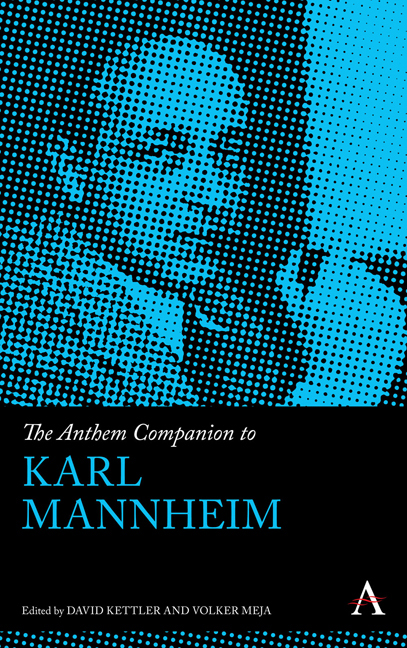Book contents
- Frontmatter
- Contents
- Introduction: Karl Mannheim as Interlocutor
- Chapter One Between Ideology and Utopia: Karl Mannheim's Quest for a Political Synthesis
- Chapter Two Karl Mannheim and the Realism Debate in Political Theory
- Chapter Three Mannheim, Mass Society and Democratic Theory
- Chapter Four Karl Mannheim and Hannah Arendt on Conduct, Action and Politics
- Chapter Five Karl Mannheim and Women's Research
- Chapter Six The Melodrama of Modernity in Karl Mannheim's Political Theory
- Chapter Seven Historicization and the Sociology of Knowledge
- Chapter Eight Karl Mannheim, T. S. Eliot and Raymond Williams: Cultural Sociology or Cultural Studies?
- Chapter Nine Karl Mannheim's Sociology of Self-Reflexivity
- Chapter Ten Praxeological Sociology of Knowledge and Documentary Method: Karl Mannheim's Framing of Empirical Research
- List of Contributors
- Index
Chapter Three - Mannheim, Mass Society and Democratic Theory
Published online by Cambridge University Press: 10 May 2018
- Frontmatter
- Contents
- Introduction: Karl Mannheim as Interlocutor
- Chapter One Between Ideology and Utopia: Karl Mannheim's Quest for a Political Synthesis
- Chapter Two Karl Mannheim and the Realism Debate in Political Theory
- Chapter Three Mannheim, Mass Society and Democratic Theory
- Chapter Four Karl Mannheim and Hannah Arendt on Conduct, Action and Politics
- Chapter Five Karl Mannheim and Women's Research
- Chapter Six The Melodrama of Modernity in Karl Mannheim's Political Theory
- Chapter Seven Historicization and the Sociology of Knowledge
- Chapter Eight Karl Mannheim, T. S. Eliot and Raymond Williams: Cultural Sociology or Cultural Studies?
- Chapter Nine Karl Mannheim's Sociology of Self-Reflexivity
- Chapter Ten Praxeological Sociology of Knowledge and Documentary Method: Karl Mannheim's Framing of Empirical Research
- List of Contributors
- Index
Summary
The main changes we are witnessing today can ultimately be traced to the fact that we are living in a Mass Society.
—Karl Mannheim, Diagnosis of Our TimeIntroduction
Democracy was a central concern of Karl Mannheim's later works in his English period. Although dedicated to the reconstruction of mass society toward democratic society, he did not fully develop his own theory of politics and democracy. Mannheim offered frequent discourses on democracy—for example, mass democracy, fundamental democratization, negative democratization, militant democracy, democratic planning—but they remained unsystematic. Nevertheless, his insights into democracy often contain instructive anticipations of contemporary democratic theory.
Mannheim, as a refugee from Nazi Germany, was especially concerned with mass society. The term mass society has greatly diminished in importance in contemporary discussions on democracy. In earlier times, many important political and social thinkers had been regarded as theorists of mass society and the masses—Alexis de Tocqueville, John Stuart Mill, José Ortega y Gasset, Erich Fromm, David Riesman, C. Wright Mills et al.—and Mannheim himself was also a central figure in mass society theory (Bramson 1961; Giner 1976; Halebsky 1976). The crisis of mass democracy was an especially urgent issue in the 1930s and 1940s disputes about democracy in the context of the problems of fascism and totalitarianism. Recently, perhaps because of the current interest in the link between politics and emotion in populism, there has been a renewed interest among theorists in classical discussions on crowd psychology by Gustave Le Bon and Gabriel Tarde, among others (Bosch 2012; Jonsson 2013). Crowd and mass are often used interchangeably. Mannheim, who was driven into exile from Germany and moved to England in 1933, also inquired into the problem of irrational mass democracy. A reconsideration of Mannheim's view on democracy may be of considerable relevance for elaborating democratic theory today.
Mass society theory has often been associated with elite theory and/ or aristocratic thought. In The Politics of Mass Society, William Kornhauser summarized the two major intellectual sources of mass society theories: aristocratic criticism of mass society and democratic criticism of mass society.
- Type
- Chapter
- Information
- The Anthem Companion to Karl Mannheim , pp. 51 - 70Publisher: Anthem PressPrint publication year: 2017



